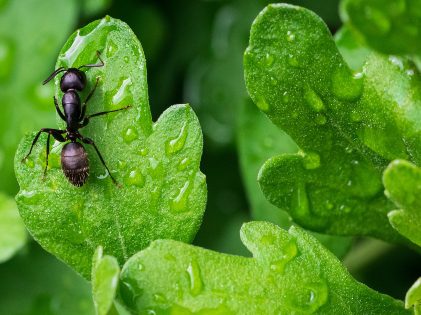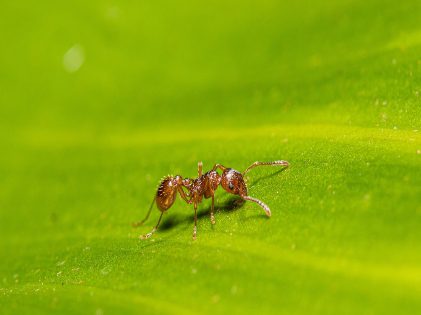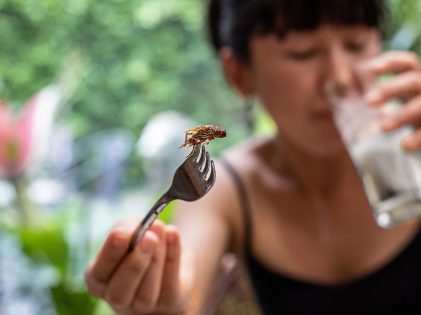
The Surprising Nutritional Benefits Of Ants

 Have you heard about entomophagy? It is a habit of eating insects. Entomophagy might be a completely uncommon thing in the Western world. However, it has been a common habit in cultures across the globe for centuries. People living in Asia, Africa, and Latin America include insects as an integral part of their diets.
Have you heard about entomophagy? It is a habit of eating insects. Entomophagy might be a completely uncommon thing in the Western world. However, it has been a common habit in cultures across the globe for centuries. People living in Asia, Africa, and Latin America include insects as an integral part of their diets.
While insects are a source of essential nutrients in some places and are delicacies in other areas, caterpillars, bees, beetles, wasps, and ants are the most commonly eaten insects. Ants are a source of protein that boosts heart health and fights oxidative stress. Here, you will get to know the pros and cons of eating ants.
World’s Popular Ant Dishes
While a majority of the countries in the West do not eat insects, they are a vital food source by many in other regions. There are many species of ants, but you cannot consume all ants. Some edible ants and the countries where they are a part of the diet are leaf-cutting ants, black ants, honey ants, and weaver ants. Leaf-cutting ants are popular in Brazil, Mexico, Panama, and Colombia.
People in Kenya and China mainly consume black ants. These ants tend to store honey in their stomachs. Honey ants are ingested by the indigenous communities residing in Australia. Weaver ants are a part of the diet in India, Sri Lanka, China, Myanmar, Bangladesh, Indonesia, the Philippines, Thailand, Laos, Cameroon, the Democratic Republic of the Congo, and Papua New Guinea.
How To Prepare Ant Dishes?

Usually, people eat ants in either adult or larvae form. They are eaten whole or as one of the main ingredients in several dishes. In India, they boil the eggs, and larvae of weaver ants add the spices. Chutney of adult ants is pretty popular in the Indian subcontinent. One can buy weaver ants in cans in Thailand.
In Laos, weaver ants give an acidic flavor to fish soups. In Mexico, leaf-cutting ants are first roasted, ground, and used to add flavor to mayonnaise. These ants are also used to make sauces. Leaf-cutting ant queens are fried and sold at local markets in Colombia. In the Peruvian Amazon, people roast or fry the weaver ants. They first roast them, and then cassava flour is added to them.
Nutritional Value
Ants are a good source of protein, minerals, vitamins, and fiber. The eggs and larvae of weaver ants give you approximately 7 grams of protein for every 100 grams. While black ants provide 40-45 grams of protein per 100 grams, leaf-cutting ants provide 42-53 grams of protein for every 100 grams. Aside from that, you get vital minerals from ants like iron, potassium, magnesium, zinc, and phosphorus. Chitin is the most common type of fiber you can get from insects. It is insoluble, and therefore, your body can’t digest chitin.
Benefits of Having Ants and Insects in Your Diet

There are various benefits of eating ants. First, it’s environmentally friendly. Increasing food production through sustainable ways has become an issue these days. Ants are edible insects, and therefore, they may be a healthy and sustainable source of food. Since insects do not have a high environmental impact, you can include them in your diet. The feed conversion efficiency in insects is quite high. This implies that in comparison to other protein sources, insects require fewer kilograms of food for every kilogram of weight gain. To make things simpler, crickets need four times less feed than sheep, while they need 12 ties less feed than cattle.
Ants are a great animal-based source of protein. The demand for meat has grown over the years owing to the growth in population globally. As a result, alternative animal protein sources can meet the demand and thereby diminish the pressure on the environment. Ants are a good source of animal protein that increases protein intake and improves the overall quality of diet. Also, insects play a role in cutting down environmental contamination.
According to some sources, ants may be a good source of antioxidants and may also improve heart health. More studies on the effects of ants on human health are underway, and researchers are trying to find if this would be a great way to boost health. Are you willing to try this ant diet? Do let us know in the comments section!
More in Nutrition & Weight Loss
-
`
Hair & Makeup Designer Sarah Rubano Talks Turning Mia Goth Into Pearl
Transforming an actor into an unrecognizable character is no small feat, and Mia Goth’s Pearl makeup in the hit movie “Pearl”...
December 17, 2024 -
`
The Physical Signs of Hunger and How Mindful Eating Makes a Difference
Hunger is one of the most basic yet essential signals our body uses to communicate its need for energy. However, many...
December 15, 2024 -
`
Why Did Chris Pratt Call Anna Faris Before Proposing to Katherine?
Chris Pratt, the beloved star of “Guardians of the Galaxy,” made headlines when he revealed that he called his ex-wife, Anna...
December 3, 2024 -
`
6 Proven Tips to Tackle Insurance Claim Denials Successfully
Claim denials are a common hurdle for healthcare providers and professionals, even for those who follow the necessary procedures to avoid...
December 1, 2024 -
`
5 ‘Bad’ Fitness TikTok Trends You Shouldn’t Follow
TikTok has become a haven for creative fitness advice. But not all trends are worth your time or your health. From...
November 23, 2024 -
`
Does Drinking Water Affect Adrenal Hormones?
Drinking water is often seen as a simple way to stay hydrated, but it has deeper effects on our body than...
November 14, 2024 -
`
Why We Feel the Loss of Celebrities So Deeply?
Celebrity grief might sound strange at first. After all, most of us have never met these famous figures in person, yet...
November 5, 2024 -
`
Are High Deductible Insurance Plans as Ideal as They Appear to Be?
High deductible insurance plans have been a hot topic for years, especially as healthcare costs continue to rise. For many Americans,...
October 31, 2024 -
`
How Training Load Data Can Transform Your Exercise Routine
Tracking progress during workouts is challenging. Simple metrics like mileage or time don’t show the whole picture. Understanding the overall effort...
October 26, 2024















You must be logged in to post a comment Login